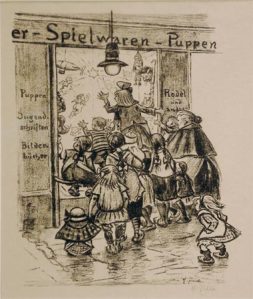I remember visiting a museum as a child. An avid reader, I longed to enjoy the magic others experienced when they visited museums and such-like wond’rous places . Not only did I want to visit them, but wanted them very much to be like The Magic Shop!
I got my wish when I went on a school trip to the museum in Pune. I do not recall its name now. It had lots of dusty bare rooms with glass panels containing objects, dull, and uninteresting, with short captions which told nothing of their stories. There was a tall, bald, curator – he spoke an alien language. Very soon, I wanted to go back home but had to endure the endless tour. If you entered from one end, you could leave only after going through a winding path through all the rooms.
It was a GREAT LETDOWN to a child.
So what went wrong? There was a great disconnect between the three of the entities involved, me , the objects and the museum staff. I had come expecting to get a taste of Wellsian magic, but I would not have minded if I had heard the objects tell me a more prosaic story. But they would not speak to me.
To me the objects looked like caged animals in a zoo; pathetic, listless copies of the original which lived enchanted lives somewhere far away. The objects could not speak to me. Plucked out of context from their surroundings where they would have been not just meaningful but magical.
Like a smoking cannon on the walls of a besieged fortress, or a quill on the table in Newton’s study in his house where it seemed that the great man himself would enter any moment to make won’drous new discoveries in science and maths, or the bones and tools of prehistoric cavemen unearthed from a cave where one could see the same vista they did hundreds of thousands of years ago. There was nothing to tell me their stories, and the museum people did not bother.

Cabinet of curiousities in the Boston Museum of Science. Note that there was no prohibition against photography in the museum. (Image:Daderot)
I’m sure, they thought me a nuisance. They objected to my dropping the wrapper of the sticky sweet on the floor, unmindful of the fact that that they had not provided me a waste basket anywhere. They grudgingly sent a beadle to show me the way to the public convenience. They cared not that I was thirsty after many hours of a hot summer day. They were only interested in shooing me past the sword that fascinated me, rudely interrupting my dream where I stood warding off a host of pirates intent on taking over my ship; indeed shooing me past everything else. We heard more instructions abut the need not to touch, or shout or run; we learnt nothing more than they were a particularly unpleasant form of adult. I resolved that I would be different.

...rudely interrupting my dream where I stood warding off a host of pirates intent on taking over my ship. (Image:Capture of Blackbeard, by JLG Ferris (1863–1930)).
As a young captain, I was shown a few books by a Colonel about a magic art that the Americans had developed called Interpretation, but alas he would not lend those sacred books to me. No matter, from what I could read in them in a few moments they were in my hands, I gathered that in America, educated, informed and most of all interesting people take the people around historical places, preserved great homes, archives, museums and made these places accessible to the visitors.
The Interpreters had studied the culture, literature, history and geography of the place – they had learnt all that and more. And when people came to see these objects, they found that there was a knowledgeable friendly person who told the stories and recreated the magic. An interpreter was not someone who prattled unendingly but aroused your curiousity, but was interested in you as a person and cared that you got to know about your heritage. The interpreter aimed, not at sating you, but tantalisingly to whet your appetite with free pamphlets to take along, signposts and charts to help his story at just the right places and links to online knowledge where you could learn to find more.
The objects in such places lay in familiar surroundings , each along-with the others in a nostalgic panorama of the past, where it was easy to visualise the story and where a hint of imagination would allow you to transport yourself to the past.
Such a museum is then a place where the objects, encouraged gently by the interpreters tell the stories and answer your queries. A fun place to learn. A veritable time machine. And there was no disconnect in such places.
Recommended Reading
This post arose due to a chain of posts initiated by various authors in the recent past. In part, it is a complement to Pradeep Mohandas’s blogpost listed below. It is likely that there will be more on this blog from me on this topic :
- Anil Dharker’s Post, titled “Dust and Babudom have mummified India’s Museums”., replicated on Times of India day before brought out the issue into mind.
- Achal Prabala’s post in the Indian Express titled “Would Gandhi have been a Wikipedian?”
- Pradeep Mohandas wrote on “When was the last time you went to a museum?” on his blog.





Recent Comments